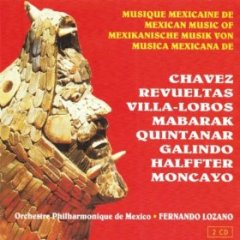Musique Mexicaine de Chavez, Revueltas, Villa-Lobos... (1995)
Musique Mexicaine de Chavez, Revueltas, Villa-Lobos... (1995)

CD1 1. Blas Galindo: La Manda, Ballet 2. Carlos Chávez: Encantamiento y Zarabanda de "La Hija de Colquide" 3. José Pablo Moncayo: Tierra de Temporal* 4. Silvestre Revueltas: Janitzio 5-8. Carlos Jiménez Mabarak: Balada del Venado y la Luna Orquesta Filarmónica de la Ciudad de México Leipzig Radio Symphony Orchestra* CD2 1-7. Rodolfo Halffter: La Madrugada del Panadero, Ballet Suite Op. 12 8-12. Silvestre Revueltas: Cinco Canciones para Niños 13. Héctor Quintanar: Fábula para Coro y Orquesta 14. Moncayo: Huapango 15. Heitor Villa-Lobos: Chôros No. 10 para Coro y Orquesta "Rasga o Coraçao" 16. Carlos Chávez: Sinfonía No. 2 "India" Orquesta Filarmónica de la Ciudad de México Fernando Lozano – conductor
Mexican music had been dominated in the 19th century by opera, its indigenous composition consisting largely of operas based on Italian or French models. The Mexican Revolution of 1910 brought massive social and cultural change, and gave the impetus to composers to draw on their country's own folk and popular traditions, and create a nationalist music. The father figure of this movement was Manuel Ponce (1882-1948), who collected popular and folk ideas, and integrated them into his own essentially European idiom, influencing other Mexican composers of the period. But it was the next generation, in particular Carlos Chávez (1899-1978) and his exact contemporary, Silvestre Revueltas (1899-1940), who in the 1930s used indigenous music as the starting point of composition, the former looking to ancient Indian models, the latter to contemporary popular cultures. Their lead was taken up by other composers, many of whom were pupils of Chávez, and Chávez's contacts in the U.S.A. ensured that this music was heard and appreciated outside Mexico.
The reaction to nationalism was led by Rodolfo Halffter (born 1900), a Spanish composer who had left Spain at the end of the Spanish Civil War, and by his pupils, influenced in the 1950s by neo-classicism, and since the 1960s increasingly by 12-tone, serial, and European avant-garde techniques. Mexico had already produced a herald of these movements, and a figure of innovative interest and influence. Starting his experiments in the late 1890s, Julian Carillo (1875-1965) developed by the 1910s and 1920s a system of micro-tonality he called `sonido trece' (`13th tone'). He had micro-tonal instruments made, and continued to write microtonal works until his death.
It was again Chávez who was responsible for so much of the vitality of Mexican contemporary music-making. In 1928 he founded the Orquesta Sinfónica de México (Mexico Symphony Orchestra), directed it until 1948, and introduced not only contemporary Mexican music but also major modern works from abroad. The orchestra has continued to play a leading role in Mexican musical life, and in disseminating Mexican music beyond its borders. In the same year (1928) he was appointed director of the National Conservatory, and through its influence continued to promote the cause of modern music. While it is invidious to single out one figure, it is nonetheless extraordinary how involved Chávez was, whether through teaching or encouraging other composers by introducing their works or giving them orchestral, conducting or teaching positions. This influence, it is interesting to note, extended beyond Mexico. The similarities between the music of the Mexican nationalists and that of Aaron Copland has often been noted. But it was only after Copland had conducted Chávez's nationalist music in Mexico that he himself turned from experimental and jazz-orientated works to the style that has become so quintessentially American. It can be argued that Mexican music was the progenitor of that style. --- Mark Morris, www.musicweb-international.com
download: uploaded anonfiles yandex 4shared solidfiles mediafire mega filecloudio binge
Zmieniony (Czwartek, 05 Grudzień 2013 16:38)








